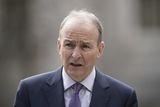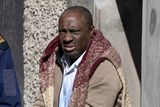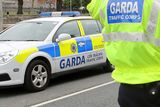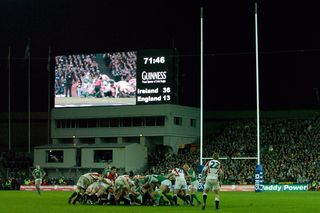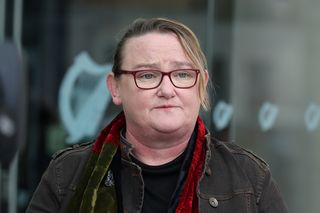Fire and brimstone divided communities
The Big Man of Ulster bestrode British and Irish politics for four decades
Ian Paisley in 1980
SINN Fein's Martin McGuinness believes the tensions threatening stability in the North would not be happening if he was still in government with his "good friend" Ian Paisley.
The Former Democratic Unionist Party leader died yesterday aged 88.
They were once political nemeses, but Mr McGuinness paid his last respects by calling on the current unionist leadership to take note of the huge advances that Mr Paisley made to the peace process.
The Stormont Deputy First Minister said he hoped Mr Paisley's death would remind people of how enemies were able to put "old difficulties aside and work together for the greater good".
"I think if Ian Paisley, 30 years younger, was leading the party then things would be different," he said.
A towering figure in British and Irish politics, Paisley led the DUP for 37 years until he stood down in 2008, having signed the historic power-sharing agreement with Sinn Fein.
His hardline stance was blamed for fueling four decades of bloodshed that claimed 3,700 lives. But his powerful U-turn provided impetus to the peace process that he had once done so much to frustrate.
Paisley's death was announced yesterday morning by the DUP and a statement from his wife Eileen.
In it, she said: "My beloved husband, Ian, entered his eternal rest this morning.
"Although ours is the grand hope of reunion, naturally as a family we are heartbroken.
"We loved him and he adored us, and our earthly lives are forever changed."
Paisley had been in poor health for some time, after a serious illness in 2005 when, he later remarked, he was "walking in death's shadow".
In February 2012, Paisley spent a week on a life-support machine due to heart problems.
The family announced that his funeral would be "private and attended only by the immediate family, as will be his burial".
It is understood the decision was influenced by the fallout from an explosive TV interview broadcast this year, in which Paisley criticised the party and church he helped to found.
Despite the acrimony, First Minister Peter Robinson described him as the founding father of a new Northern Ireland.
Tributes flooded in from politicians from Britain and Ireland, many who saw both sides of the firebrand statesman.
Taoiseach Enda Kenny said Paisley was a divisive figure in early life - but his greatest legacy was peace in the North.
"Ian Paisley was a dominating and a towering figure in Northern politics and in the politics of this island for very many years.
"In his early career, clearly he was a divisive figurehead. But his legacy will be one that turned towards peace and I'm happy that he lived to see the peace for which he worked in the closing years of his career brought about."
Former Taoiseach Bertie Ahern said: "Ian was a big man. He had a big heart. In my younger days I found him a very difficult character, but we ended up good friends."
And British Prime Minister David Cameron acknowledged Mr Paisley's bold move in entering government with Sinn Fein.
"His decision to take his party into government with Sinn Fein in 2007 required great courage and leadership, for which everyone in these islands should be grateful," he said.
Mr Cameron said that in the House of Commons, his great oratory stood out. "Ian Paisley will be remembered by many as the 'big man' of Northern Ireland politics. He will be greatly missed."
Mr Cameron's predecessors, Tony Blair and John Major, lauded an implacable opponent of compromise who became a peacemaker. Mr Blair, who helped oversee the Good Friday Agreement in 1998, said: "Ian was a man of deep convictions. The convictions never changed. But his appreciation of the possibilities of peace did. He began as the militant. He ended as the peacemaker."
Ironically, just hours before hearing of Mr Paisley's death, Mr McGuinness delivered a hard-hitting speech attacking unionist politicians who he claimed "routinely excuse and defend racism, sectarianism and homophobia".
The criticisms come after months of tensions in the North - with running battles between unionist protesters and police following controversial rulings over flags and parades.
Join the Irish Independent WhatsApp channel
Stay up to date with all the latest news


